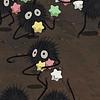You need to sign in or sign up before continuing.
Take a photo of a barcode or cover
informative
reflective
medium-paced
challenging
dark
emotional
hopeful
informative
reflective
sad
medium-paced
challenging
dark
tense
medium-paced
informative
fast-paced
reflective
fast-paced
Me ha parecido muy interesante y me ha ayudado a poner en palabras cosas que tenía en la cabeza y que había hablado con mis amigas.
Creo que al final invita a colectivizarse y a colectivizar el cansancio, pero sí que es cierto que se me queda corto para el momento actual.
Creo que al final invita a colectivizarse y a colectivizar el cansancio, pero sí que es cierto que se me queda corto para el momento actual.
medium-paced
I usually do not read non-fiction because most non-fiction books "sound" the same. In addition, instead of introducing new ideas, they merely "clarify" existing ideas. I often feel stupid reading non-fiction books. Hence, I avoid them.
Han's books are different. Reading his books, I get to glimpse at the other side of the wall: the inner-workings of this world, this society, this culture.
I took a full 7-page long notes while reading this book.
First of all, he makes many influential philosophers' ideas somewhat obsolete (among them the obvious giants like Freud, Foucault, Agamben, Arendt) because according to him, we don't live in a disciplinary-society anymore; we live in achievement-society. Instead of hospitals, madhouses, prisons, barracks, and factories, our focus nowadays are on fitness studios, office towers, banks, airports, shopping malls, and genetic laboratories.
No one has to oppress us anymore; the system is set up so that we oppress ourselves to death, to be the maximal production human-being in a society. We have compulsive freedom, a paradoxical yet interesting concept.
Nowadays, we deal with excessive positivity. There are no more negativities. What ushers in is the violence of positivity. I now understand how much "negatives" are important in human lives. Without them, we are merely machines, like computers and ChatGPT, which depend on only positives to produce an answer. (I think that, binary system, as an input, are both positives although they are labeled + and -). Calculating instead of thinking. Thinking can't do without negatives.
One interesting idea:
We often do multi-tasking nowadays because... we kind of have to. According to Han, multi-tasking is common among wild animals. They never just eat. They eat and watch out for predators. Their survival depends on their ability to multi-task. We humans are regressing to animals as we also have to be able to multi-task in order to survive in this demanding society.
What multi-tasking habit results in: 1) incapable of contemplative immersion, 2) increase in bullying (both in school and society), and 3) survival > good life.
He revisits past literature and interprets it in a very creative and thought-provoking ways. For examples in this book, 1) Merville's Bartleby and 2) Handke's essay on tiredness.
I will probably read all of Han's books. Truly eye-opening.
Han's books are different. Reading his books, I get to glimpse at the other side of the wall: the inner-workings of this world, this society, this culture.
I took a full 7-page long notes while reading this book.
First of all, he makes many influential philosophers' ideas somewhat obsolete (among them the obvious giants like Freud, Foucault, Agamben, Arendt) because according to him, we don't live in a disciplinary-society anymore; we live in achievement-society. Instead of hospitals, madhouses, prisons, barracks, and factories, our focus nowadays are on fitness studios, office towers, banks, airports, shopping malls, and genetic laboratories.
No one has to oppress us anymore; the system is set up so that we oppress ourselves to death, to be the maximal production human-being in a society. We have compulsive freedom, a paradoxical yet interesting concept.
Nowadays, we deal with excessive positivity. There are no more negativities. What ushers in is the violence of positivity. I now understand how much "negatives" are important in human lives. Without them, we are merely machines, like computers and ChatGPT, which depend on only positives to produce an answer. (I think that, binary system, as an input, are both positives although they are labeled + and -). Calculating instead of thinking. Thinking can't do without negatives.
One interesting idea:
We often do multi-tasking nowadays because... we kind of have to. According to Han, multi-tasking is common among wild animals. They never just eat. They eat and watch out for predators. Their survival depends on their ability to multi-task. We humans are regressing to animals as we also have to be able to multi-task in order to survive in this demanding society.
What multi-tasking habit results in: 1) incapable of contemplative immersion, 2) increase in bullying (both in school and society), and 3) survival > good life.
He revisits past literature and interprets it in a very creative and thought-provoking ways. For examples in this book, 1) Merville's Bartleby and 2) Handke's essay on tiredness.
I will probably read all of Han's books. Truly eye-opening.
challenging
informative
reflective
medium-paced
Muy actual para haber sido publicado hace 11 años pero esperaba más. Se queda un poco corto.
dark
informative
reflective
fast-paced




